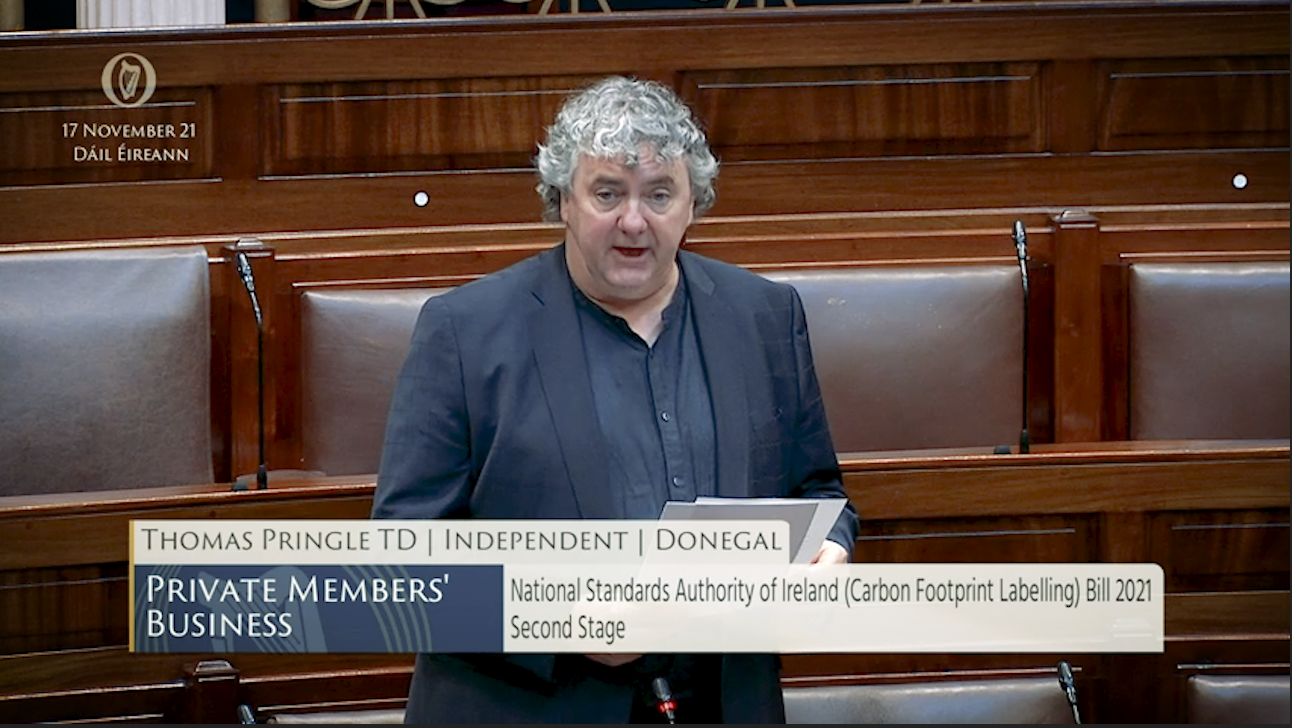- Pringle: We need a policy that recognises the importance of inshore fishing
- Pringle: Disabled people and carers face crisis of State neglect
- Pringle: Failed FF/FG housing policies forcing people to put their lives on hold
- Pringle welcomes Donegal council motion on Occupied Territories Bill: ‘We cannot stand by in the face of genocide’
Pringle says climate change work must focus on ‘just transition’ policies
- Updated: 17th November 2021

Independent TD for Donegal, Thomas Pringle, said carbon labelling is a useful tool, but doesn’t begin to address the ‘just transition’ policies needed to tackle the climate crisis.
Addressing the Dáil today, Deputy Pringle said he supports the introduction of carbon labelling on products as a way to educate citizens on the carbon footprint of each product. He was speaking on the Labour bill to promote the use of carbon labelling.
Deputy Pringle said: “Carbon labelling on products would help us to identify which producers are the biggest carbon emitters and this has the potential to educate citizens on the environmental impact of the products they are buying. It would allow them to compare the sustainability of products and I support any attempt to encourage the purchase of locally produced goods.
“As a bill with the aim to properly tackle climate change however, the Carbon Labelling Bill is incredibly weak and doesn’t even begin to address the systemic problems that we face and need to address in this country. I believe that this is nothing more than tokenism in that regard.
“The idea that we all need to take personal responsibility in order to effectively address the climate crisis, when we have the likes of data centres using up an incredible amount of energy, is ridiculous and demonstrably false,” he said.
Deputy Pringle said: “If we are to address the climate crisis in a real and impactful way, then we need good environmental and just transition policy that targets the largest producers of emissions and not the working classes.
“Families on lower incomes are more likely to buy products with a higher carbon footprint due to their cheaper price. We cannot begin to penalise those who can only afford to compare price instead of carbon footprint.
“This bill is just one of the many climate bills disproportionately affecting lower-income families instead of targeting the real problem of high emissions from farming and industry and the macro-structures of unsustainability such as capitalism and colonialism,” he said.
The deputy said the idea of a carbon footprint was promoted by oil companies.
He said: “The very notion of focusing on individual responsibility was popularised by BP, the second largest non-state-owned oil company in the world, in order to shift the blame away from them and instead suggest that climate change was the fault of individuals and not of fossil fuel companies. Does that not tell us everything we need to know?”
Deputy Pringle concluded: “In the face of the terrible climate crisis that we face, it is incredibly important that climate legislation is our primary focus now. But let’s step away from the greenwashing and do this in a real and just way.”



